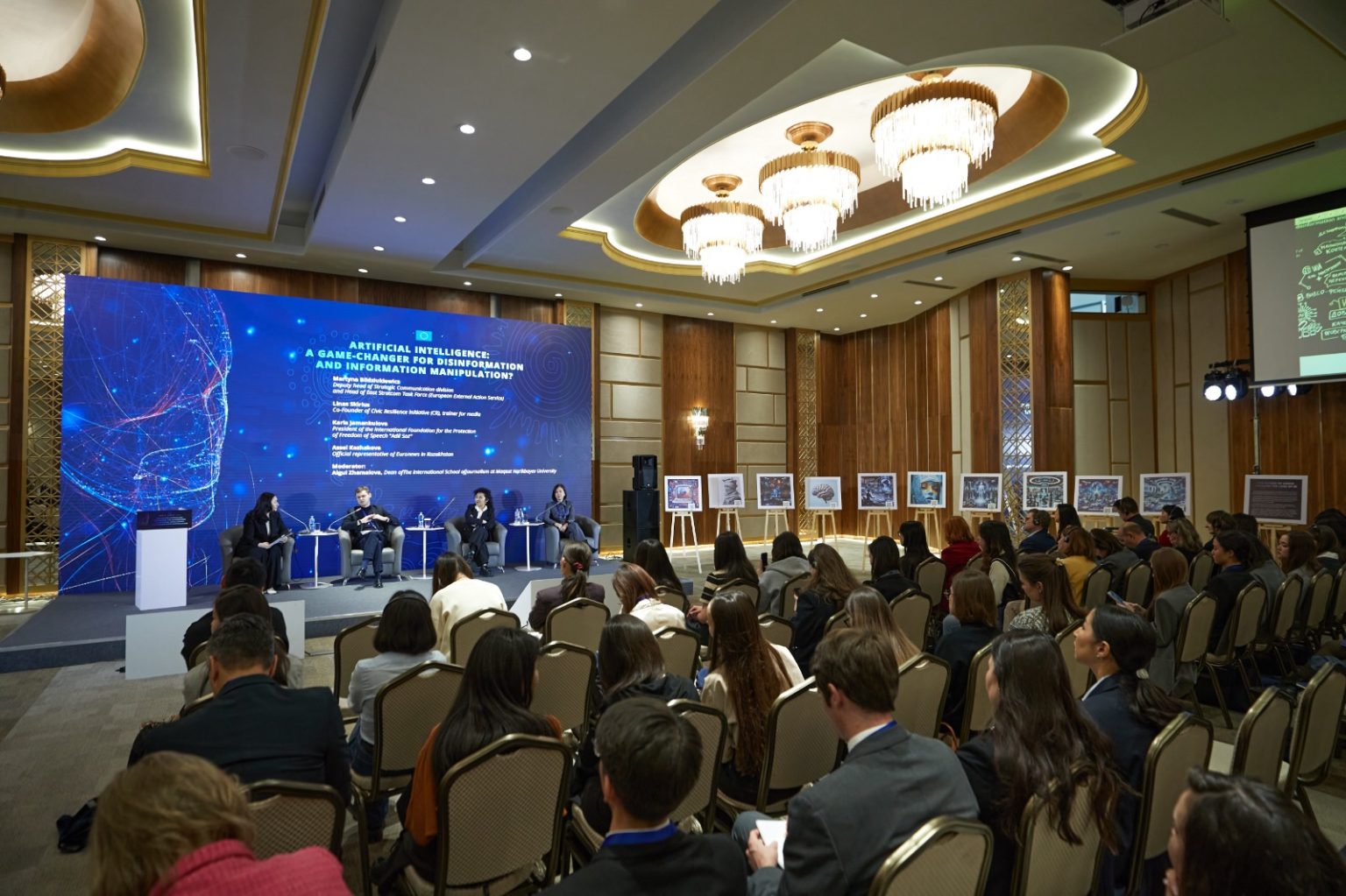Listen to the article
European Union Hosts Second Media Forum in Kazakhstan, Focusing on AI in Journalism
The European Union Delegation to Kazakhstan convened its second annual Media Forum in Astana on December 5, bringing together journalists, fact-checkers, researchers, and media professionals to explore artificial intelligence’s growing influence on journalism and strategies to combat information manipulation.
European Union Ambassador to Kazakhstan Aleska Simkic opened the event with a clear message on the EU’s dedication to fighting disinformation while supporting ethical journalism standards.
“The EU is committed to raising awareness about information manipulation and disinformation, to fight it and to build resilience against it, both in the EU and globally – together with partners,” Simkic said. “Emerging technologies like Artificial Intelligence can serve as either a weapon or a shield in the fight against disinformation—what matters is how we use and understand them.”
The ambassador emphasized that building resilience against information manipulation requires collaborative efforts through awareness and knowledge-sharing to protect journalistic integrity.
Talgat Narikbayev, Chairman of the Board at Maqsut Narikbayev University, reinforced this sentiment, noting that “advancing journalistic practices and countering misinformation are critical steps toward fostering public trust and protecting democratic values.”
The forum comes at a pivotal moment for Kazakhstan’s media landscape, which has experienced significant changes in recent years as digital platforms have transformed how news is created and consumed. The country, strategically positioned in Central Asia, has become increasingly important to EU diplomatic and economic interests, making media cooperation a key aspect of bilateral relations.
A highlight of the event was an exhibition titled “The Future of Media Through the Lens of AI,” which showcased AI-generated images created by students from Maqsut Narikbayev University alongside works from EU Member States’ representatives. The collection examined how language, AI tools, and individual interpretation influence creative outcomes in media production.
This exhibition offered journalists and media professionals a chance to reflect on AI’s potential impacts on their profession, from content creation to verification challenges. As media organizations worldwide grapple with integrating AI tools while maintaining journalistic standards, such exhibitions provide valuable opportunities for hands-on learning and ethical consideration.
Attendees participated in two interactive workshops designed to equip them with practical skills. The first, “How to Deal with Contemporary Information Manipulation?”, focused on strategies to identify and counter disinformation campaigns—a growing concern in Kazakhstan and globally as social media platforms accelerate the spread of false information.
The second workshop, “Should a Journalist Harness Artificial Intelligence?”, delved into the ethical dimensions and practical applications of AI in journalism. Experienced European trainers led both sessions, sharing insights from the EU’s own experiences confronting disinformation challenges.
The EU’s focus on media literacy and disinformation in Kazakhstan reflects broader efforts across Central Asia, where information ecosystems are rapidly evolving. In recent years, the region has seen increasing digital connectivity alongside heightened concerns about foreign information influence operations and domestic information control.
This year’s Media Forum builds on the EU’s ongoing initiatives to strengthen independent journalism in Kazakhstan and throughout Central Asia. The EU has previously funded training programs, technical support, and exchanges for journalists from the region as part of its commitment to supporting civil society and press freedom.
For Kazakhstan’s media professionals, the forum provided valuable networking opportunities with European counterparts and access to international best practices at a time when journalists face mounting challenges from both technological disruption and information manipulation.
As media outlets in Kazakhstan adapt to an increasingly digital environment, collaborations like this forum help build capacity for responsible, fact-based reporting that can withstand the pressures of information manipulation while embracing beneficial technological innovations.
The EU Delegation indicated plans to continue such initiatives, positioning the annual Media Forum as a cornerstone of its engagement with Kazakhstan’s evolving media landscape and its broader commitment to democratic values across Central Asia.
Verify This Yourself
Use these professional tools to fact-check and investigate claims independently
Reverse Image Search
Check if this image has been used elsewhere or in different contexts
Ask Our AI About This Claim
Get instant answers with web-powered AI analysis
Related Fact-Checks
See what other fact-checkers have said about similar claims
Want More Verification Tools?
Access our full suite of professional disinformation monitoring and investigation tools




8 Comments
Interesting to see the EU focusing on the impact of AI on journalism. Responsible use of emerging tech is crucial to combat disinformation while upholding ethical standards.
Agreed. It’s a complex issue, but collaborative efforts to raise awareness and share knowledge are important steps in the right direction.
Navigating the intersection of AI and journalism is a complex task, but this forum seems like a step in the right direction. Looking forward to seeing the outcomes.
This forum seems like a valuable platform for discussing the challenges and opportunities presented by AI in journalism. Curious to see what practical solutions emerge.
The EU’s emphasis on building resilience against disinformation through awareness and collaboration is encouraging. Protecting journalistic integrity is crucial in these times.
Agreed. It will be interesting to see how the EU’s efforts in this area evolve and potentially influence global media standards.
Glad to see the EU taking a proactive stance on this. Information manipulation is a growing concern, and addressing it requires a multi-faceted approach.
Absolutely. Journalists and media professionals need to stay vigilant and embrace responsible AI practices to protect the integrity of their work.